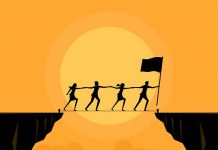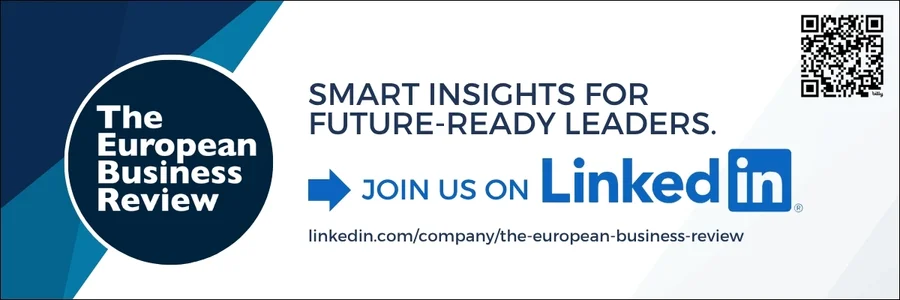The year 2020 will remain in our collective memory as a “crisis” year. It is the year where COVID-19 hit the world and brought to the surface many challenges and problems that our contemporary organizations and societies are facing and solutions will need to be sought for in the future (De Cremer, 2020a). When such an unanticipated crisis hits, what can organizations do? Many business lessons and books have been written what kind of leadership it takes to deal with a crisis and the business of the so-called “crisis-leadership” is literally blooming – as the old saying goes: For every winner there is a loser and vice versa.
A usual first step is that companies have to be aware and accept the fact that a crisis is being faced and that action will have to be taken (De Cremer, 2020b). Just like many companies have a rather “reactive” culture where change is not easily accepted as people tend to stick to what they know and what they were always doing, an unavoidable crisis situation (like COVID-19) requires that there is little choice left: something needs to be done. A following challenge is that when leaders realize they need to do something, they may shoot from the hips and try out a variety of things. In other words, it becomes a trial-and-error competition and as a result teams will be at loss and it becomes difficult for leaders to motivate and inspire them. Indeed, all too often, company leaders do too little or too much, and both options usually fail. What is needed is that crisis situations are being led in ways that manages to strike a balance between using the values and foundations that define and have always defined the company while at the same time being open to experimenting and testing new ways of working and doing business that will take shape in the aftermath of the crisis.
This balance idea where a threat to the old way of doing is present and the challenge for the future is explored while being embedded in the crisis situation is something that I recognize in the Chinese word for crisis (pinyin: wēijī). This word means “dangerous” and thus constitutes a threat to the status quo. Moreover, because of such threat it means the person, organization or society has arrived at a turning point and action is needed. But, it is not necessarily that you act right away. After all, you’re at a turning point, but you do need to think and test what it is that you will be doing. So, a crisis situation puts pressure and threatens the usual ways of doing in an organization. It establishes a sense of awareness that things are changing, but in this process of change an important question is “how do you best approach dealing with the crisis at hand?” After all, successful change does not happen overnight. And, many companies facing a crisis can be compared to oil tankers that take a long time to turn. In light of this challenge, in an earlier piece, I identified four principles that leaders having to deal with an unexpected crisis have to do (De Cremer, 2020c). An important issue that I would like to address in this article is whether the “balanced” view that I just outlined is applicable and can actually be observed in how companies respond to crisis situations?
Starting from a Chinese perspective on the word crisis, a belief exists in China that one company reflects this “balancing” act more than others (Tao, De Cremer, & Chun, 2017) and this company is Huawei. Founded in 1987 by Ren Zhengfei, Huawei is one of the giants in the world of telecommunication technology, infrastructure and smart devices. They operate in more than 170 countries and in the fiscal year of 2019 Huawei’s revenue reached CNY858.833 billion (US$122.972 billion) and CNY62.656 billion (US$8.971 billion) in net profit. Although Ren Zhengfei is not the acting CEO (Huawei uses a rotating CEO platform, see De Cremer & Tao, 2015), he still is recognized as the “face” of the company and when he speaks the company listens. It is then also no surprise that Ren Zhengfei’s style has influenced Huawei leadership more than anything else. How does this style relate to the four principles of leadership needed in a crisis situation?
De Cremer (2020c) identified four principles that leaders should stick to in leading their team members to keep their company relevant to the outside world.
1. Stay in touch with your customers
When the crisis is happening, it is difficult to deliver tangible value to customers in real time. The company is trying to make sense of what is happening, and while you may not be able to deliver in ways that customers are used to, it’s important that you stay connected to them. In a sense, the focus on and connection with the customer is a value that you build throughout the existence of you company and as any important value can help to buffer yourself when crisis hits.
From this point of view, Huawei is a champion in using customer commitment as a source of energy to deal with crisis situations. In Huawei (in good and bad times) the primary goal of the company is always identified by trying to provide the best service to the customer possible. Because of this focus, taking care and connecting with customers is experienced by many employees as their natural born mission. In times of crisis where products and services cannot always be delivered, companies need to show loyalty to customers and make clear that the company lives by this mantra. This way, your customers are more likely to sit out a crisis situation together with you or, at least, return in the aftermath of the crisis. In Huawei this commitment to the customer is communicated very expressively by the slogan – known by all – that the company expects employees to turn their back to their bosses and face the customer if this is needed to improve commitment and service to that customer. This powerful slogan makes clear that there is no doubt that Huawei is perfectly equipped to implement the first crisis leadership principle.
2. Look for creative ways to reflect the values and quality of your organisation and keep your stakeholders involved in this movement
A common wisdom is that how you act under situations of crisis says something about who you are. Indeed, under those circumstances, the actions and decisions you take will indicate what your priorities are. What interests you truly want to pursue. For this reason, we then also assume that a crisis makes the true personality of a person or organization speak. As I indicated earlier, it’s important that already in good times, the organization works on being clear and transparent on the values that are important to the company. When things go bad, there will be no uncertainty about what it exactly is that the company wants to achieve and why. These values will be guidelines for the company but also for all stakeholders. It helps customers to understand what the company stands for and how they will help customers.
Huawei exists for the customer and this value is as transparent as can be. As a result, both internally (employees) and externally (customers) this value is understood and forms the light tower everyone relies on to be guided throughout any storm (crisis). A value can this way serve as the glue between companies and customers and form an inclusive alliance. In line with this philosophy, Ren Zhengefi, for example has emphasized the inclusive society at Huawei, by noting that “At Huawei, we have a tradition of living in groups and sharing food”, and this collaborative effort exists to do a better job as a community, which includes customers as their primary partner. It is this value, he believes, that helps facilitating communication with customers and being constructive and more effective in looking for better service and solutions. Using the words of Ren Zhengfei when mentioning how customers have to be approached: “We must be honest and above-board, frank. Speak our minds and be tactful.”
3. It’s time to experiment and fail (!) and learn (!), because if not now, then when?
Crisis situations represent danger to the status quo and in doing so signal that in the future new ways of working will be needed. What these new ways will be is not always clear, and therefore in crisis situations courage is needed to test, experiment and explore what new ways can work in combination with the values that drive the company. It’s this kind of courage that will help for a company to grow again in the aftermath of the crisis and thus to survive.
If there is one word in Huawei (besides customer) that is central to the leadership philosophy of Ren Zhengfei then it will be “survival” (De Cremer, 2019). In the foreword of their 2019 report rotating Chairman Eric Xu noted at one point that “survival will be Huawei’s first priority.” As it usually goes within Huawei, the way to survive is to “optimise” their own functioning and install – once again – an attitude “to fight inertia and rid themselves of complacency.” The anecdote goes that at one occasion, someone asked Ren Zhengfei what Huawei’s most basic goal was. He replied: “Survival.” The person then asked what Huawei’s ultimate goal was. Ren Zhengfei replied that it was also survival. This determination to do what is needed for the company to survive reveals a strong sense of determination and willingness to fight for what he believes in. And, this can be taken quite literally. For example, at an internal meeting in 2018, Ren Zhengfei said the following: “Today at this meeting, I saw you make a vow: “If I ‘die’ on the battlefield, I will be a hero; if not, I will be a general. If I become ‘disabled’ and still can’t make it to the top, I will cook in the secondary battalion. No matter what, I won’t leave the battlefield. I will hold onto this battlefield, forge ahead courageously, and uphold the spirit of ‘One Battalion, One Gun'”.”
Fighting inertia to survive has led Huawei to emphasize the importance of experimentation and playing around with idea to come up with new ways of looking at the same problems (De Cremer & Tao, 2016). In doing so, Huawei has gradually allowed for higher levels of failure among its innovation teams to ensure that new ideas will continue to be generated. Being creative as an intellectual challenge is something that fits well with the personality of their leader as he is “big” on creating a learning driven culture where people read, think and read more.
4. Don’t make any hard deals as nothing can be guaranteed today (what worked in the past may not be the case anymore in the near future)
Many organizations feel the pressure to keep making deals and meet their KPI’s, but in times of crisis spending goes down and customer demand can take some weird forms. Of course, no company exists without revenue, but the level of pressure does differ. If there is too much focus on the metrics, even in times of crisis, the company will not invest in learning and experimentation during the crisis and at the same time not meet its KPI’s. The result will be that the company performed poorly during the crisis (which is quite common), but at the same time is also not ready for the future.
Huawei’s philosophy of not wanting to become a public company makes that they can more easily stick to this fourth principle of crisis leadership. Not being listed helps Huawei to stay dedicated over a longer period of time, without losing our passion and enthusiasm – and this is something that customers notice during a crisis (De Cremer, 2018). Ren Zhengfei believes so much in staying a private company that he once privately made the assertion: “If we do not go public, we might someday take over the world.” The reason that he believes this is that as a private company he sees that: “We should set rules, and draw clear boundaries, but also leaving enough space in between the lines.” Such view on how a company should work, allows for Huawei to reduce pressure in times of crisis and if it’s needed. With less pressure and a focus on thinking how the future will look like enables Huawei to build the next step in their survival. In short, for a company that thinks all the time about survival, every day may well be experienced as a crisis, and it’s for that reason that they may have little competition when it comes down to being the crisis leader par excellence.
About the Author

David De Cremer is a Provost’s chair and professor in management and organizations at NUS Business School, National University of Singapore. He is the founder and director of the corporate-sponsored “Centre on AI Technology for Humankind” at NUS Business school. Before moving to NUS, he was the KPMG endowed chaired professor in management studies and current honorary fellow at Cambridge Judge Business School. He is also a fellow at St. Edmunds College, Cambridge University. He is named one of the World’s top 30 management gurus and speakers in 2020 by the organization GlobalGurus, one of the “2021 Thinkers50 Radar list of 30 next generation business thinkers”, nominated for the Thinkers50 Distinguished 2021 award for Digital Thinking (a bi-annual gala event that the Financial Times deemed the “Oscars of Management Thinking”) and included in the World Top 2% of scientists (published by Stanford). He is a best-selling author with his co-authored book (with Tian Tao and Wu Chunbo) on “Huawei: Leadership, Culture and Connectivity” (2018) having received global recognition. His recent book “Leadership by Algorithm: Who leads and who follows in the AI era?” (2020) received critical acclaim worldwide, was named one of the 15 leadership books to read in Summer 2020 by Wharton and the kindle version of the book reached the no. 1 at amazon.com. His latest book is “On the emergence and understanding of Asian Global Leadership”, which was named management book of the month July (2021) by De Gruyter. His website: www.daviddecremer.com
References
- De Cremer, D. (2017). Making customer centricity work for your company. The European Financial Review. October-November, 64-67.
- De Cremer, D. (2018). On the joy of not being a listed company. The World Financial Review, March-April, 26-29.
- De Cremer, D. (2019). Hard-Wired to survive in the UC-China trade war. The European Financial Review, August-September, 7-11.
- De Cremer (2020a). Why COVID-19 teaches us the importance of trust at work. Knowledge@Wharton. 5 June.
- De Cremer, D. (2020b). Be a fool! It’s what really matters in crisis leadership. The European Business Review, May-June, 32-37.
- De Cremer, D. (2020c). What makes you an effective leader in crisis situations? The European Business Review, May-June.
- De Cremer, D., & Tao, T. (2015). Leadership innovation: The rotating CEO system of Huawei. The European Business Review. November/December,10-13.
- De Cremer, D., & Tao, T. (2016). Creating Effective Organizational Systems through Experimenting with Human Nature. The European Business Review, November/December, 6-10.
- Tao, T., De Cremer, D., & Chunbo, W. (2017). Huawei: Leadership, culture and connectivity. Sage Publishing.









